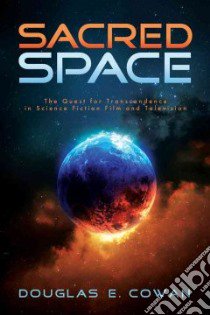Sacred Space - 9781602582385
Un libro in lingua di Cowan Douglas E. edito da Baylor Univ Pr, 2010
- € 37.20
- Il prezzo è variabile in funzione del cambio della valuta d’origine
"From the `millennial dreams' and `apocalyptic nightmares' of alien contact to the Buddhist visions of Neo's matrix, Doug Cowan weaves a grand adventure for fans and students of religion and science fiction."---Conrad Ostwalt, Professor of Religious Studies, Appalachian State University
"Carefully researched, beautifully written and accessible, Sacred Space is one of the most enjoyable books on religion and popular culture I've read this year."---Christopher Partridge, Department of Politics, Philosophy and Religion, Lancaster University
"A must-read for anyone who is intrigued by the deeper significance and relevance of science fiction. Cowan's fusion of a fan's enthusiasm with a scholar's inquisitiveness sets his work apart from so much other writing on popular culture or religious studies."---Kim Paffenroth, author of Gospel of the Living Dead: George Romero's Visions of Hell on Earth
"Highly recommended. Here we learn that science fiction is more than bugeyed aliens and saucers---and that it often reveals our quest for the sacred."---John W. Morehead, editor of www.theofantastique.com
Science fiction, according to Douglas Cowan, is the genre of possibility and hope, a principal canvas on which writers, artists, and filmmakers have for generations sketched their visions of humanity's transcendent potential. Drawing on the most popular examples---Star Wars, Star Trek, Battlestar Galactica, Babylon 5, and Stargate SG-1---as well as the lesser known but no less important, Sacred Space reveals the multivalent religious ideas present in these media. Why do the themes that consistently appear in science fiction matter? What do they reveal about the often ambivalent relationship between outer space and our spirits? Cowan insightfully demonstrates how these films and shows express and reinforce culturally constructed conceptions of transcendent hope, and along the way provides a provocative reflection on what this ultimately says about our culture's worldviews, hopes, and fears
Informazioni bibliografiche
- Titolo del Libro in lingua: Sacred Space
- Sottotitolo: The Quest for Transcendence in Science Fiction Film and Television
- Autore: Cowan Douglas E.
- Editore: Baylor Univ Pr
- Collana: Baylor Univ Pr (Paperback)
- Data di Pubblicazione: 15 Agosto '10
- Genere: PERFORMING ARTS
- Argomenti : Science fiction films History and criticism Science fiction television programs History and criticism Religion in motion pictures
- Pagine: 314
- ISBN-10: 1602582386
- EAN-13: 9781602582385


